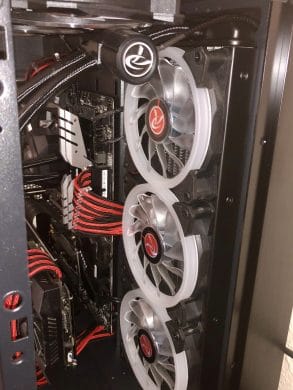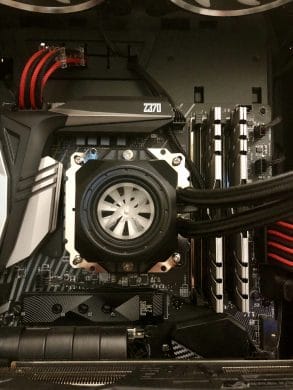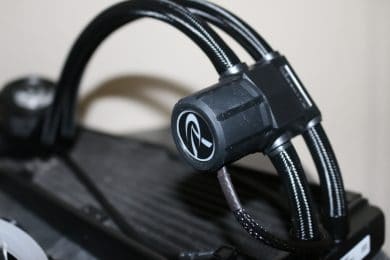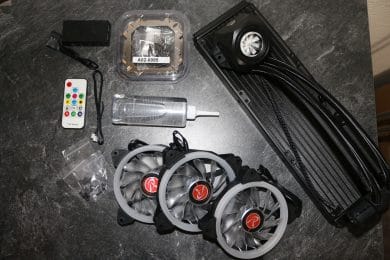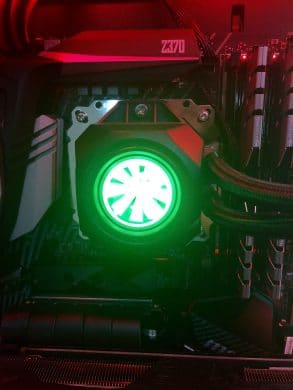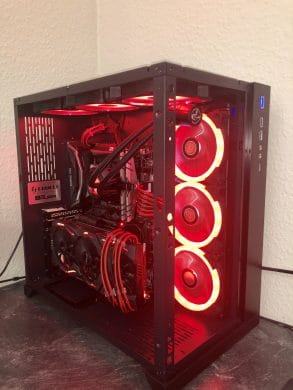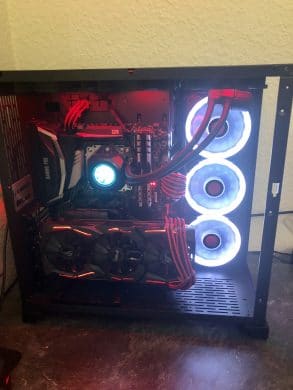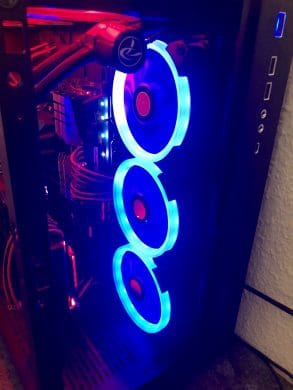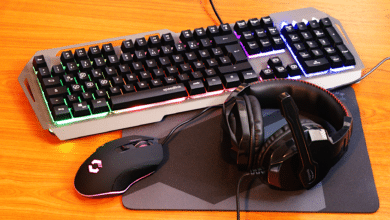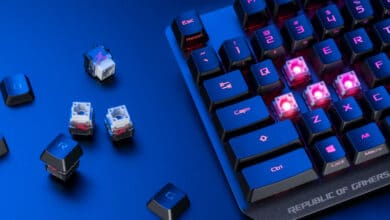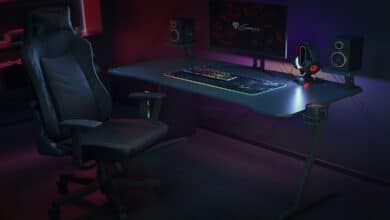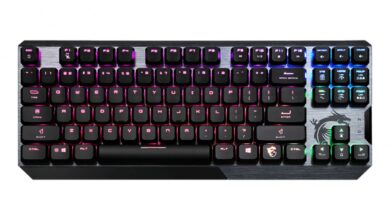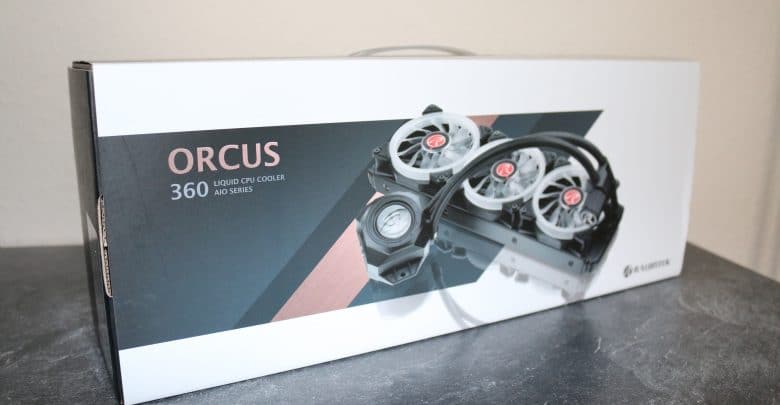
We were able to test the new Raijintek Orcus compact water cooling system, which is the first of the all-in-one water cooling systems to feature a pump in the hose, a flow indicator and, of course, impressive lighting. This test will show you how the top model with 360 mm radiator performs in terms of workmanship, cooling capacity and features.
Technical Data
| Radiator (W x H x D) | 120 x 28 x 395 mm |
| Hose length | approx. 35 cm |
| Filling quantity | 210 ml ± 10 % |
| Fan | 3x 120 mm Raijintek Iris Connection: 4-pin PWM Bearing type: Hydraulic Speed: 800 – 1,800 rpm Volume: max. 23 dB(A) Delivery volume: max. 71.65 m³/h Static pressure: max. 1.7 mm H2O Current: 0.14 A Power consumption: 1,68 Watt ± 10 % |
| Pump | size: 69.5 x 33 x 40 mm (W x H x D) Bearing type: Ceramic Capacity: max. 66 litres/h Head: 1,3 m Volume: 25 dB(A) Speed: 5,000 rpm ± 10 % at 12 V Current: 180 mA power consumption: 2.2 W |
| Compatibility | Intel 775, 1150, 1151, 1155, 1156, 1366, 2011, 2066 AMD AM2, AM2+, AM3, AM3+, AM4, FM2, FM2+ |
| Price | Product |
Workmanship & Installation
At first glance, the Raijintek Orcus makes a very good impression and looks like a normal compact water cooler. The hoses are sleeved and all components show a clean workmanship quality on the surface. A special feature of the Orcus is the outsourced pump. Many AiO water cooling systems have a pump in the heat sink, which can often lead to audible vibration transmissions and thus disturbing noises. Raijintek goes another way here and installs the pump decoupled in the hose. This is to prevent or absorb pump noise. In the heat sink there is now room for a flow meter, which is properly set in scene and also looks very chic in operation.
The radiator itself is made of aluminium and has a depth of 27 millimetres. Therefore it is very compact and similar to many other compact water cooling systems. Of course, the three fans should mainly stand out due to their lighting, whose LEDs sit in the frame and let it shine impressively.
The installation was as far as possible uncomplicated. A backplate on the back of the mainboard holds the mounting frame on the front, which is equipped with spacers. On this frame the actual cooler is fastened with only two screws. The Raijintek Orcus is compatible with numerous sockets from AMD and Intel. The radiator was mounted in our housing on the side and equipped with the enclosed fans. There was a point deduction at this point, because either the fan or the radiator was slightly warped. As a result, more force had to be expended than should be necessary.
Despite the numerous fan and lighting cables, a relatively tidy overall picture can be achieved. The LED cables including the controller can be stowed on the rear side, as the remote control does not require a direct line of sight. This means that only the thin fan cables and the pump cable have to be connected to the mainboard. The latter does not have to be laid over half the board because of the pump position.
The delivery also includes a small bottle with coolant, which can be used to refill the Raijintek Orcus either directly on the heat sink or on the radiator via corresponding openings. However, this is only necessary if the level of the coolant has dropped significantly due to evaporation over time. Practically, we can always check this on the flow indicator.
Volume & Power
In terms of performance, we need to differentiate a little. If we first take a closer look at the radiator, it is particularly noticeable that the lamella density is relatively low. This means that the radiator works very well with slowly rotating fans due to its low air resistance, but in reverse, less heat can be emitted than with radiators with high lamella density and correspondingly strong and good fans.
The header used in the test system Intel i7-8700K Processor comes with the Rajintek Orcus RGB at 26°C idle and 59°C under load with Prime95. The temperatures can be seen and leave air for overclocking. The fans were not running at full speed.
This leads us directly to the included fans, which according to Raijintek work in a speed range between 800 and 1,800 rpm. During operation, however, the fans are not unmistakable. Sometimes we even have the impression that the background noise changes more often, even if the load on the system has not changed. An interesting alternative is Core version of the Raijintek Orcus that comes without any fans. This allows the user to select the fans and explicitly opt for models that have been optimized for radiators. This allows much better cooling and less noise at the end of the day.
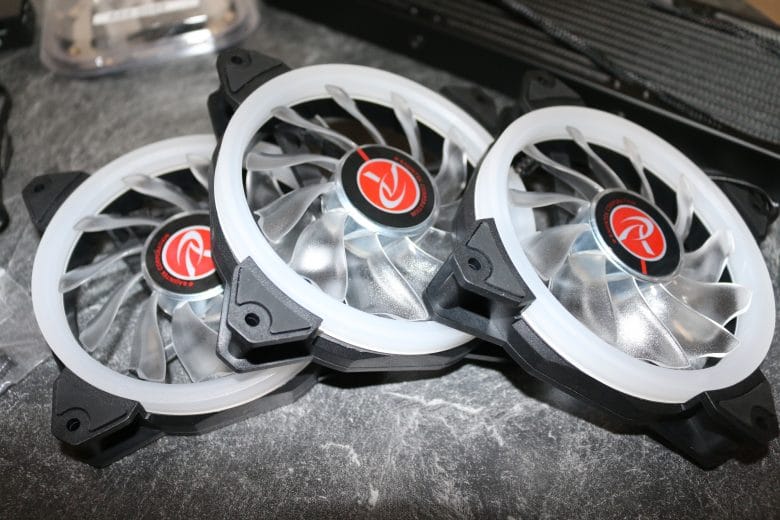
LED Illumination
Raijintek has once again put a lot of effort into lighting the Orcus, because in addition to the three 120 mm fans included, the flow meter in the heat sink can also be illuminated in colour. Fan and heat sink are connected via LED cable to the enclosed hub. This in turn can be controlled directly via a mainboard with RGB LED connection or the wireless remote control.
The adjustment possibilities of the LED lighting are very extensive. The lighting can be programmed to different colours and effects using the remote control. For a detailed overview of the possibilities we recommend to take a look at the manufacturer’s page.
Result of the Raijintek Orcus AiO Water Cooling Review
The result of our test shows that the Raijintek Orcus 360 is a very good compact water cooler with RGB LED lighting for the called price of Product, but it also lets air up. Positive things to mention are the decoupled pump in the hose, the stylish flow indicator and of course the extensive RGB LED lighting, which can be controlled via a compatible mainboard or the included remote control. The fans included in the package are a bit negative, as some of them get quite loud and unfortunately don’t provide the best cooling performance either. But here you can also buy the core version, which comes without a fan. This saves you just under 25 euros and allows you to invest in more powerful and quieter alternative fans.
However, if you’re just looking for a stylish compact water cooling system and don’t want to overclock your system into the immeasurable, the Raijintek Orcus is a good choice.
Raijintek Orcus 360 RGB
Design
Features
Usability
Cooling Performance
Assembly
If you're looking for a stylish compact water cooling system and don't want to overclock your system into the immeasurable, the Raijintek Orcus is the perfect choice.
